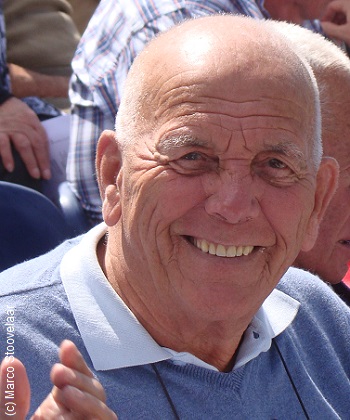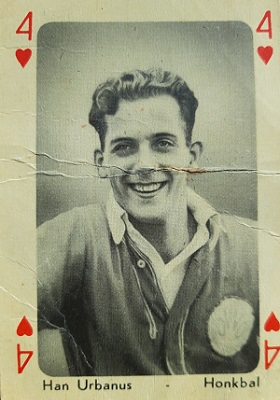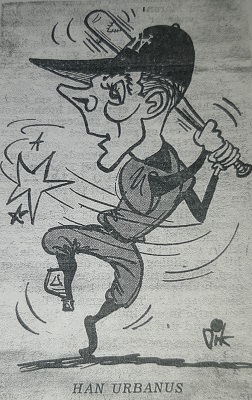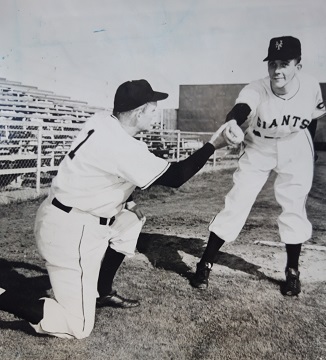 |
Spring training, New York Giants, 1952:
Dutch superstar pitcher Hannie Urbanus
and Giants manager Leo Durocher. |
Hannie Urbanus died Friday in The Netherlands at age 93. This is stunning to me because I thought he long ago had left us. He was my first baseball hero.
In fact, he was the only baseball player I knew of until we came to the United States in early 1956.
Of course, that name will be foreign to you ... unless you are -- or were -- Dutch, and only then if you were a sports fan, or more specifically a honkbal fan. That's the Dutch word for baseball.
Hannie Urbanus was the superstar of the sport in our home country, a right-handed pitcher for the OVVO team in Amsterdam. They were the Dutch Yankees, the perennial 1950s champions.
He was good enough to warrant a month-long spring-training stay with the 1952 New York Giants, the reigning National League champions. It was more of an exhibition appearance rather than a tryout. When he returned to Holland, he resumed leading his team to championships and as the No. 1 pitcher for the national team.
Baseball was far from a major sport in The Netherlands in the late 1940s and early 1950s when we lived there. Soccer (voetbal) was the sport most people cared about, although other sports that were popular included cycling, swimming, speed skating, basketball, track and field, field hockey, and an odd mixed-gender sport called korfbal -- a derivative of basketball, without dribbling -- in which Holland was the world's best.
Here is how I learned about Hannie Urbanus and baseball:
In 1955 (the year before we left), the Blue Band margarine company in Holland sponsored a series of small publications -- 10 books in all -- titled 40 Sporten en Spelen in Woord en Beeld (40 Sports and Games in Words and Images).
Here was history, highlights, photos, rules of all these sports. It was great for a kid who was absorbed in it all and loved to read. Soccer was the main emphasis, of course, and there were only two relatively small sections on honkbal/baseball.
Still didn't understand the game much because we'd never seen it played, even though home base for Hannie Urbanus and his OVVO team was in Amsterdam.
To collect the books, and the paste-in photos, I suppose, we had to buy lots and lots of Blue Band margarine. And we did.
Those books, bound together in a neat folder, came with us to the U.S., and they're right here -- barely holding together; they're fragile -- on a shelf to my left as I type this.
And here was Hannie Urbanus' photo from that book (which also is online now). Seeing notice of his death today sent me on a Google search for Hannie Urbanus. Here, from www.knbsb.nl, is the headline on the best story -- really his life's story -- that I found:
honkbal icoon, heuvel legende, en hall of famer han urbanus overleden
Translated: Baseball icon, hill legend and Hall of Famer Han Urbanus passed away
---
Here is the first portion of that story:
IN MEMORIAM ... Han Urbanus ...
(1927 - 2021) ...
(© Photo: Marco Stoovelaar) |
Han Urbanus , who played in the Dutch big league in four decades, pitched eleven no-hitters and played for the National Team for 17 years, passed away on Friday (February 5) at the age of 93. With the Netherlands National Baseball Team , Han Urbanus won seven consecutive European titles. Urbanus also participated in Major League spring training with New York Giants, was a member of the Dutch Hall of Fame, and was a living legend and Dutch baseball icon.
|
Consider some of his feats: -- Eleven no-hitter, from 1954 through 1961 (take that, Nolan Ryan). That included nine for OVVO and a couple in the rivalry national-team games with neighbor Belgium. Twice (1954, 1956) he pitched two no-hitters in one season.
-- He was selected the Dutch major league's "Best Pitcher" five times (1953-55, 1957-58), and set a league record for strikeouts (213) in 1955, a record that stood until 1980. He was the league MVP three times (1954-55, 1961).
-- He also played second base and shortstop at times for OVVO and the national team, and was a solid hitter with home-run power. In 1959, he was the league's Best Hitter with a .348 average.
-- He played in 64 international games, a record at the time of his retirement.
He played in the highest division for four decades (1947-70) and his 24 seasons was a long-standing record.
| |
... On the left a unique playing card with the portrait of Han Urbanus ...
... On the right a caricature made by the famous draftsman ...
... Dik Bruijnesteijn, which was used in newspapers ... |
---
In 1952, at age 24, he received a unique invitation -- the first European player to take part in one of America's major-league spring training camps. It was the Giants' camp in Phoenix that included BobbyThomson (whose famous pennant-winning home run was the previous October), Wes Westrum, Alvin Dark, Sal Maglie, Monte Irvin, Hoyt Wilhem, Jim Hearn, Larry Jansen ... and a young Willie Mays.
The manager was Leo "The Lip" Durocher. Frank Shellenback was the pitching coach.
From the story:
A year earlier, Urbanus had been interviewed by Albert Balink, the publisher and editor of 'The Knickerbocker,' a Dutch/American magazine for Dutch immigrants in America. It was Balink who arranged the trip to promote and stimulate baseball in Europe.
When Urbanus received the invitation in February, he worked as an assistant accountant at an Amsterdam office. His employer immediately gave him the opportunity to travel to America. ... In an interview in Het Parool at the time, Urbanus said: "I just wonder if I will be able to keep up with the level. And if they ask to remain as a professional, I refuse firmly.'' He was described as 'a calm and jovial man of 24 years old.' "
... Han Urbanus receives instructions from ...
... New York Giants Pitching Coach ...
... Frank Shellenback ... |
When Urbanus returned a month later on March 15, he brought back an instructional video and in the weeks and months that followed he traveled across the country to lecture on pitching, what he had learned and what it's like to participate in a professional training camp. All these lectures were organized by clubs or the union in canteens or rented halls that were packed with many baseball enthusiasts. In an article in the Algemeen Dagblad, Urbanus said: “To my great surprise, I have experienced that in America people throw completely differently. Besides, I learned that the pitchers are completely focused on pitching and not hitting themselves. '' Urbanus also wrote many articles about pitching and the correct way to throw a ball in Baseball News.
---
And then there was the Urbanus tie-in to Texas.
His grandson Nick Urbanus, who was a star in the Dutch leagues playing for the Amsterdam Pirates, signed with the Texas Rangers' organization in 2011 and was a middle infielder in the rookie leagues and Class A for four seasons. But he never hit much here, and returned to play in Holland.
Throughout his life, Hannie was a constant -- and revered -- presence at any baseball gathering of note in The Netherlands, and also in Europe. He remained visible almost to the end, always the ambassador for the game.
And always a Dutch hero, including one baseball fan in Fort Worth. Hannie preceded even Mickey Mantle.



















